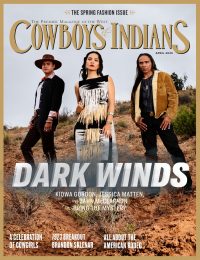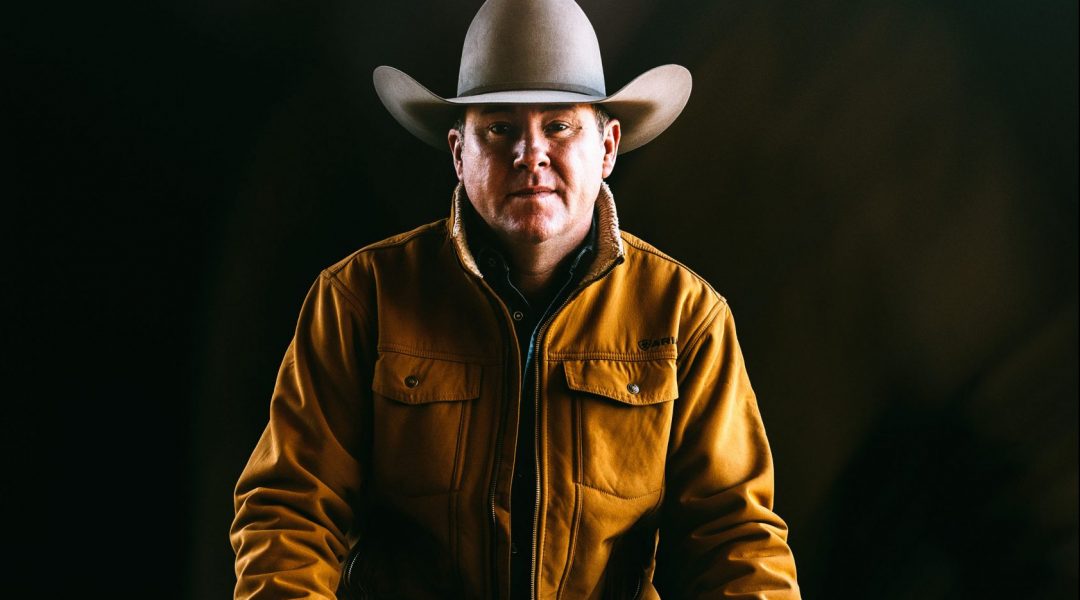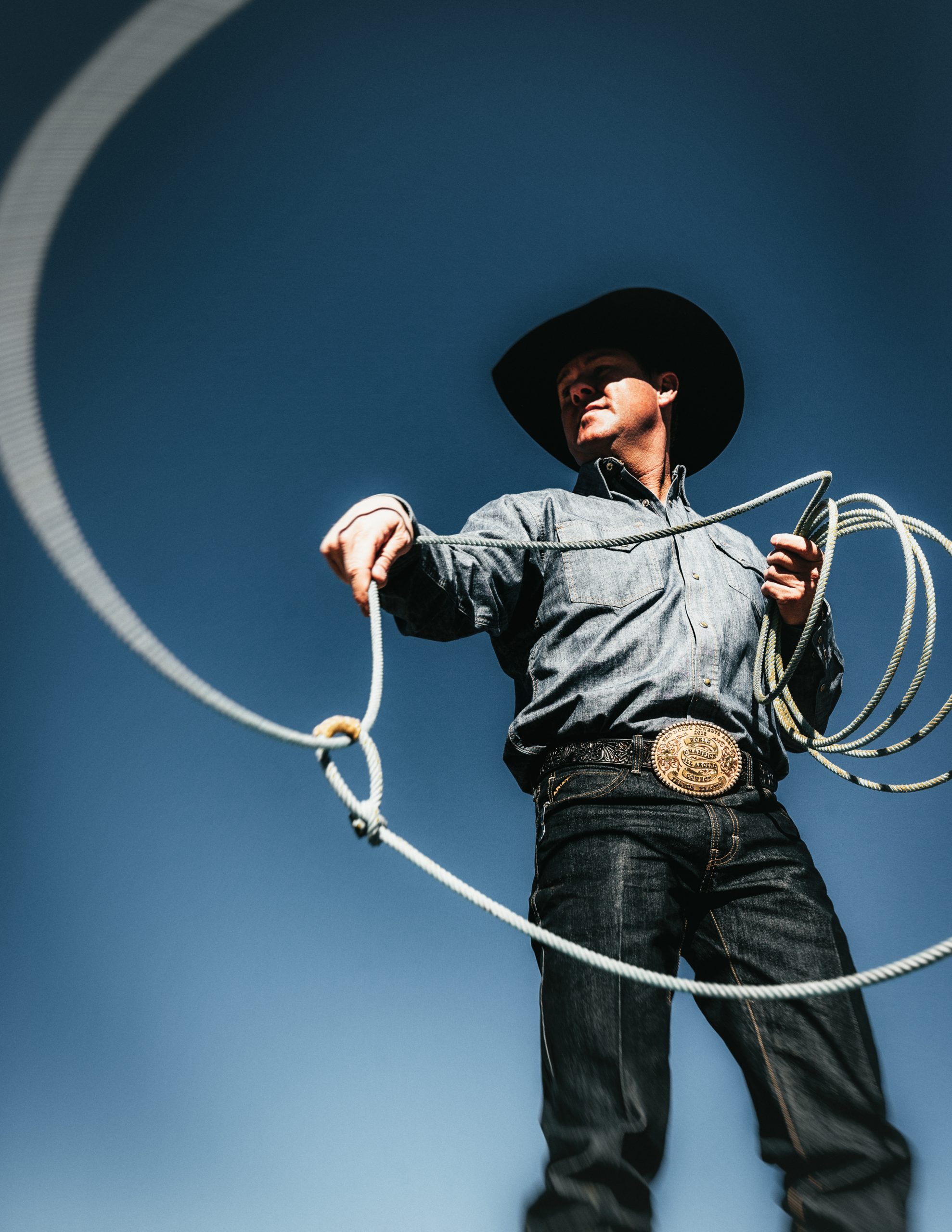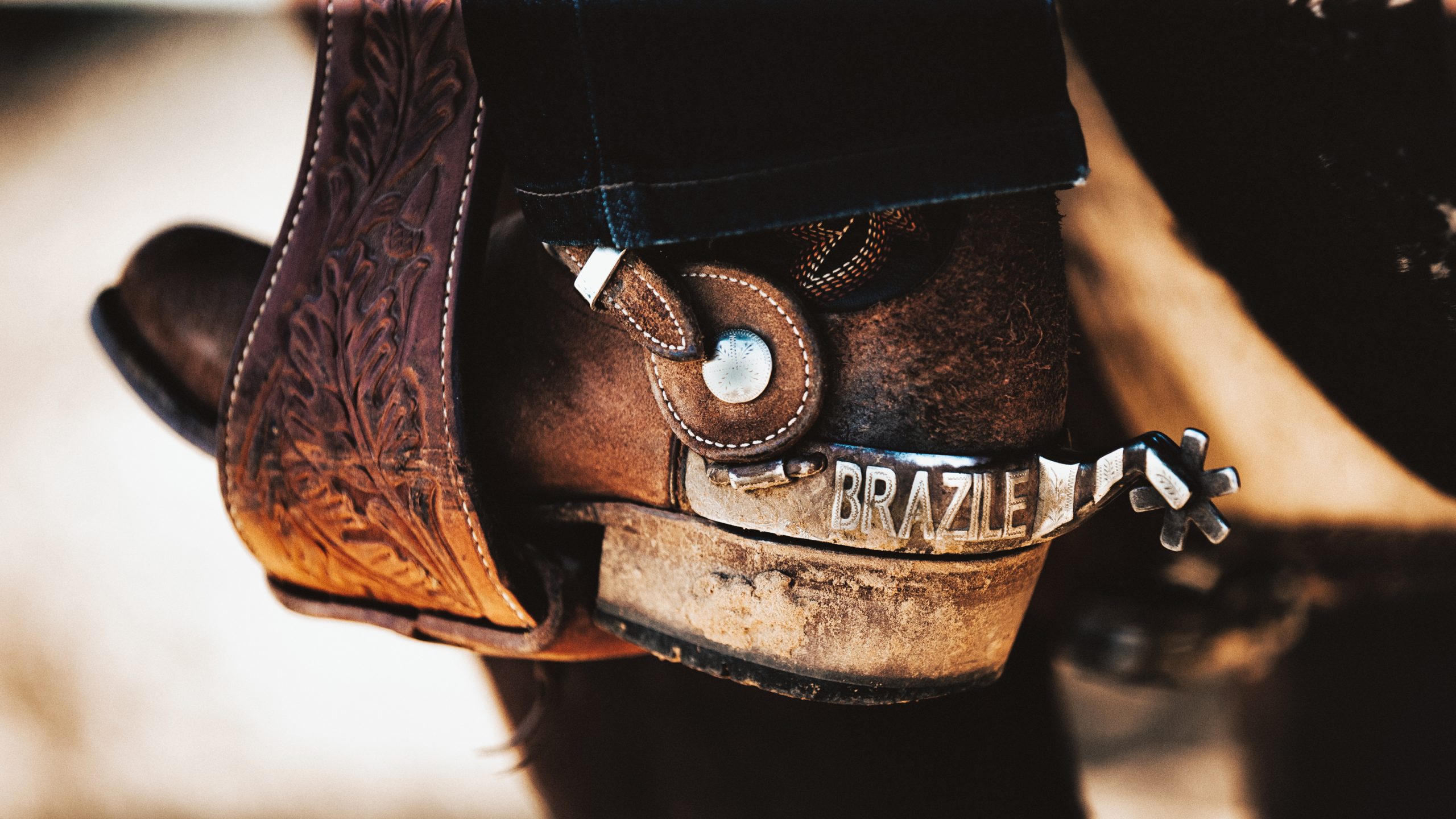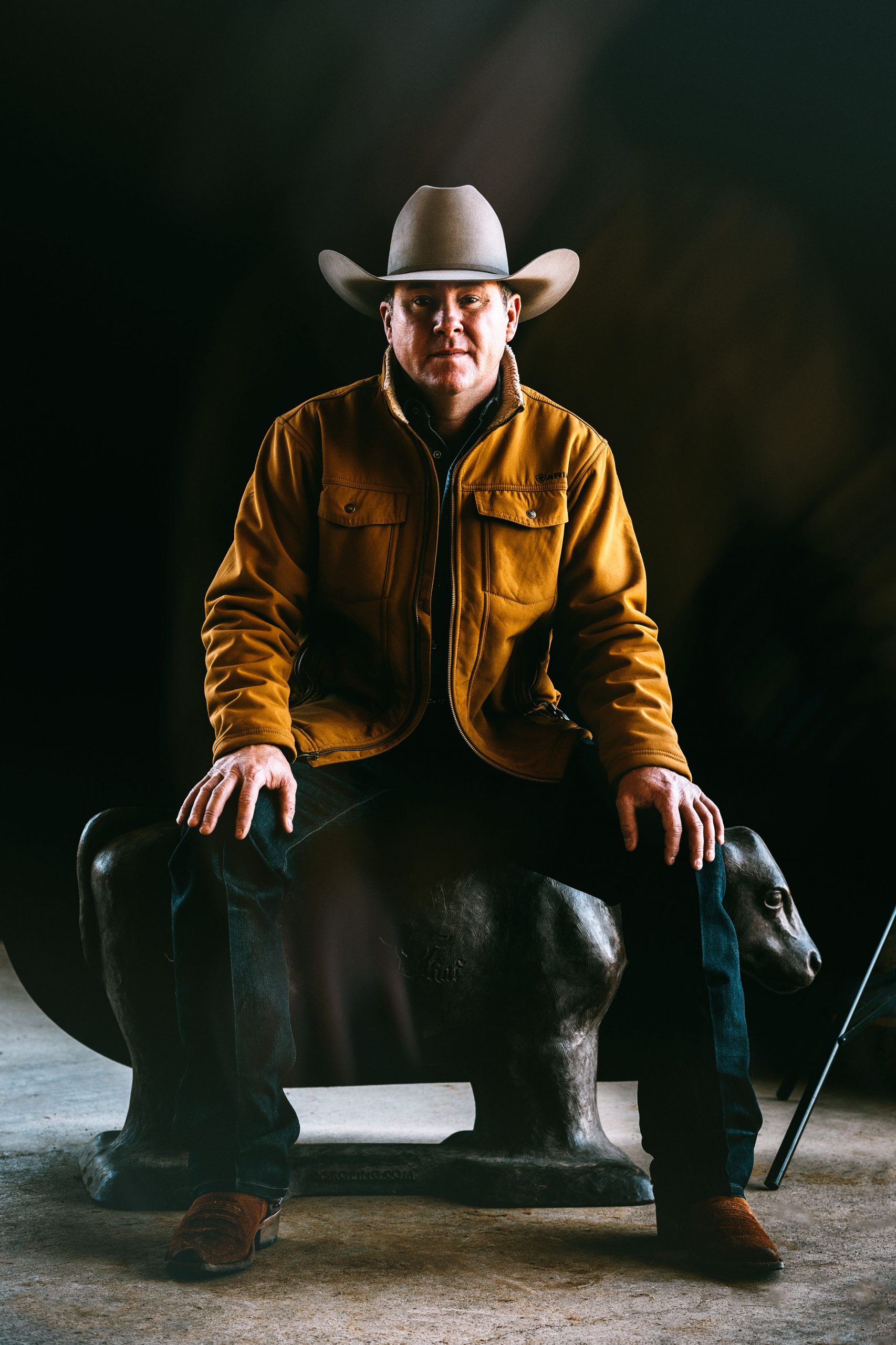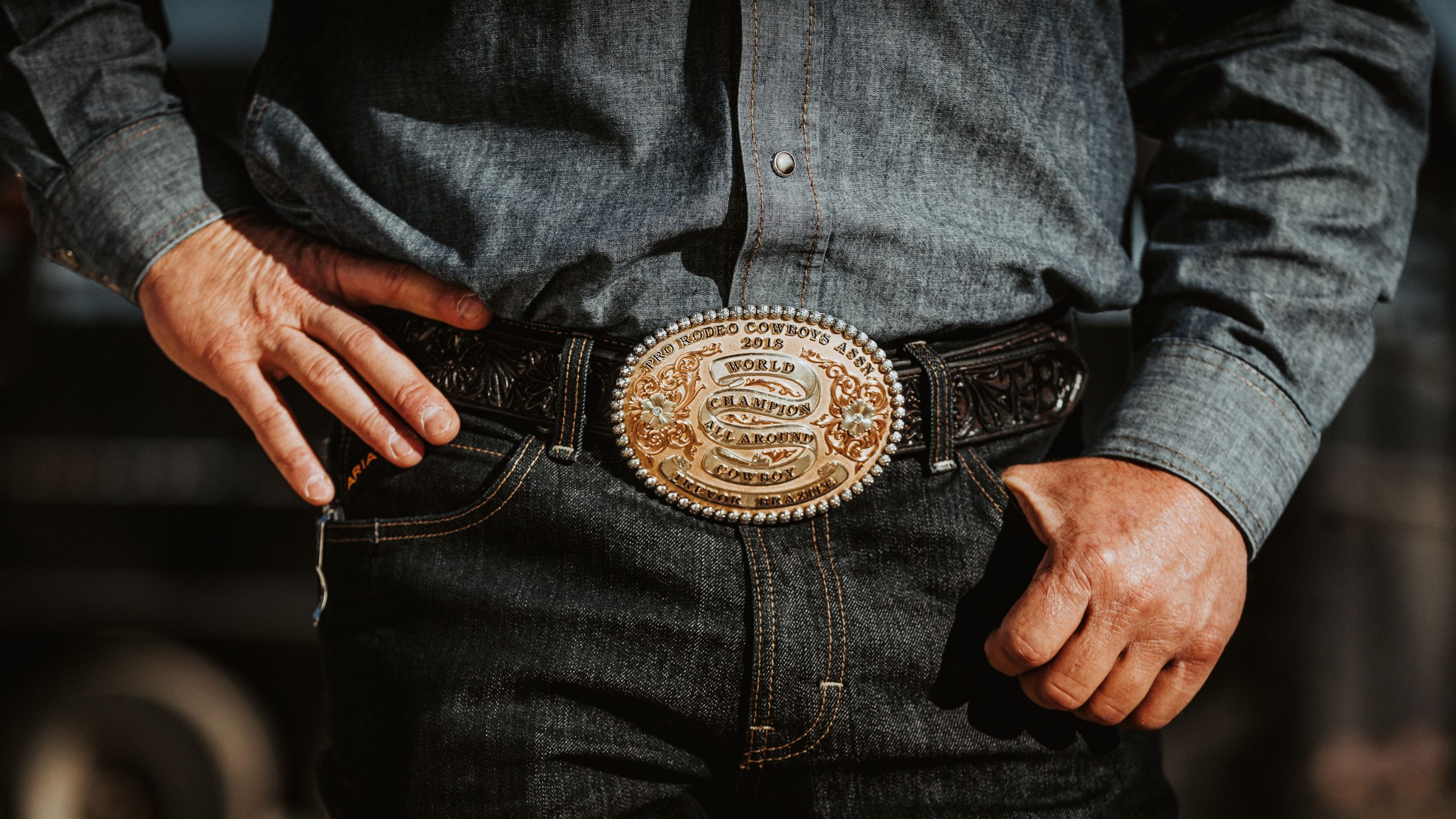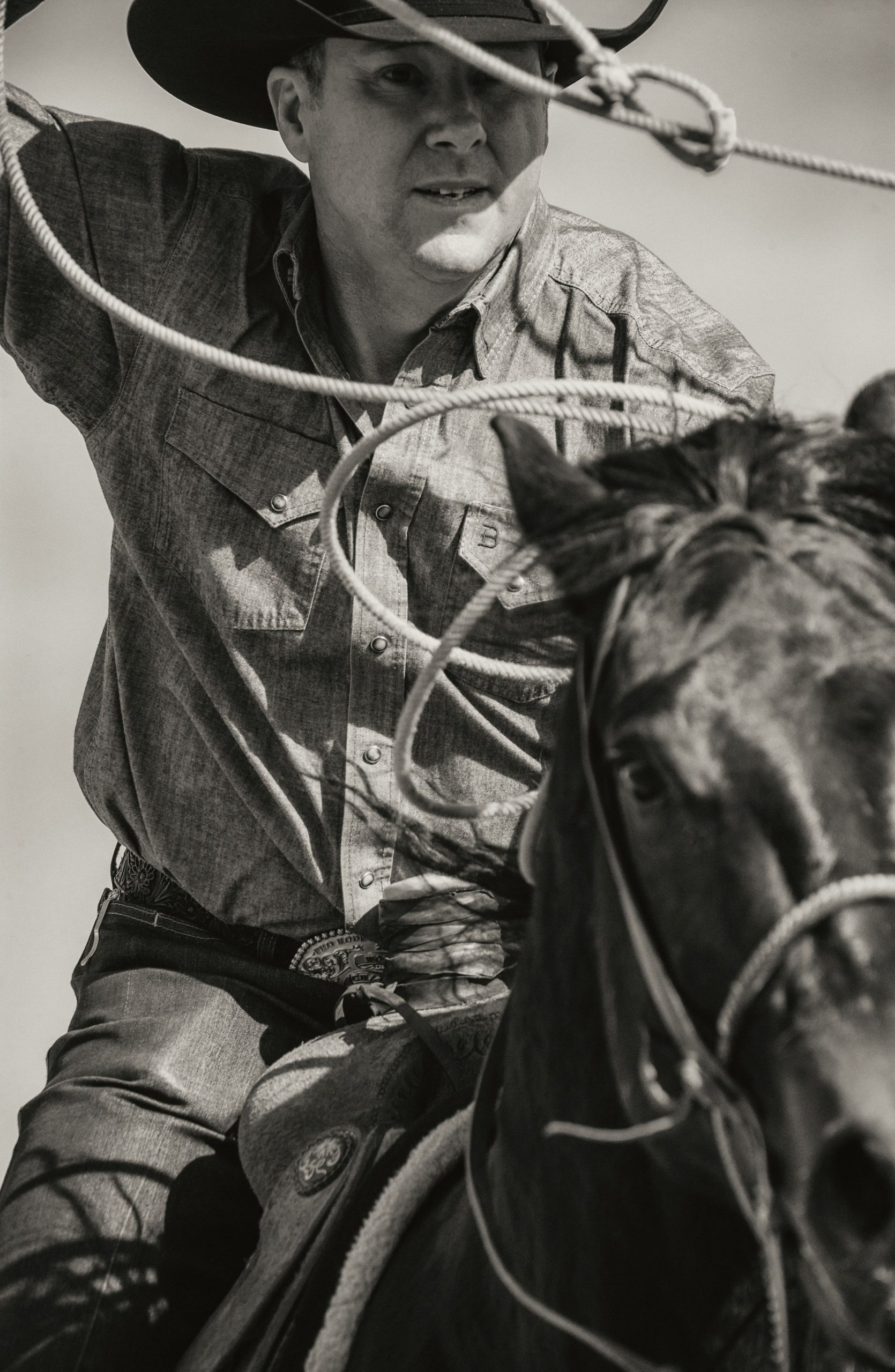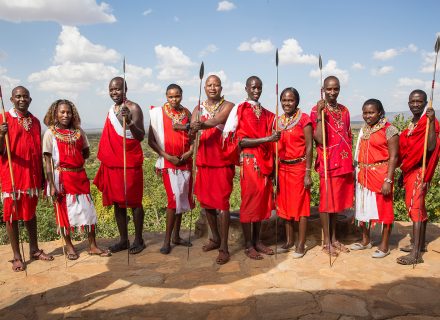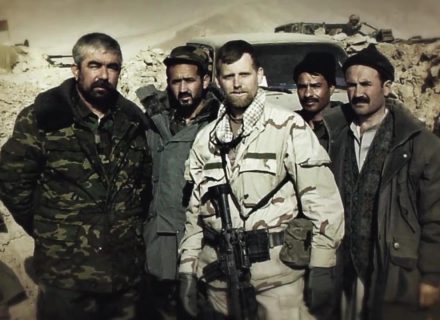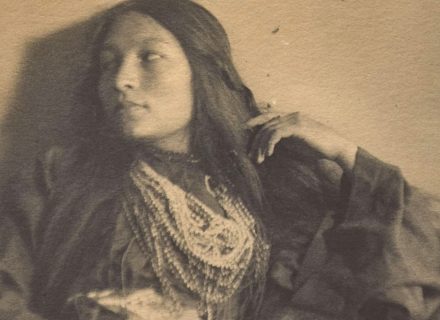Since he stopped living on the road and in the dust, rodeo roper hero Trevor Brazile has settled into a horse-centered life in the longtime cowboy town of Decatur in rodeo-friendly Wise County, Texas.
Trevor Brazile sits high on his horse with rope in hand on a billboard on the outskirts of Decatur, a historic Friday Night Lights town in North Texas known for rodeo legends. Brazile is one of them. A team, tie-down, and steer roper, he's won more world championship belt buckles than any other cowboy in history. He’s been called rodeo’s answer to Superman. A multiple Rodeo Hall of Famer, he’s bagged 26 PRCA world titles, which is indicated in bold lettering on the billboard on the outskirts of town, and 14 All-Around Cowboy World Champion titles. The billboard advertises a museum dedicated to him and another local Rodeo Hall of Fame legend, Roy “Super Looper” Cooper, at the popular NRS—National Roper’s Supply—an “all things Western” destination store just off U.S. Route 287 on the south side of town.
Brazile makes his home in Decatur with his wife, Shada, Cooper’s stepdaughter — herself a world-class barrel racer who’s also from Decatur — and their three children on a 100-acre ranch here, where they breed American Quarter Horses. Born in Amarillo in the Texas Panhandle about 300 miles to the northwest of here, Brazile’s been around Decatur for most of his adult life. His father moved to Decatur in ’93. Ten years later, Brazile bought a ranch there. He’s made appearances in the local newspaper, the Wise County Messenger. But he’s been making frequent appearances in national headlines around the country since he became a PRCA cowboy in 1996.
His stepfather-in-law, an eight-time world roping champion, had been popping up in headlines when Brazile was still in diapers. He hails from a legendary rodeo family and mentored Brazile when he was coming up on the rodeo circuit in the late ’80s and early ’90s. “At his prime, he [Brazile] had no competition,” Joe Beaver, an eight-time NFR champion roper and one of Roy’s many traveling partners, told the Smithsonian Magazine in a 2018 profile of Brazile. “He was so consistent. He was so fast and so darn good. He rarely made any mistakes. What he could do in the arena was unreal. He’s probably the greatest roper that has ever been.”
In Wise County, he’s just one of several rodeo champions who have called this North Texas county of about 78,000 people home. World champion Gus Pickett; “Cowboy” Alvin Baker, a well-known rodeo announcer and performer; and Dan Webb, a Texas Rodeo Cowboy Hall of Famer who won his first All-Around Cowboy Saddle in 1972, were born and raised in the area. Others, like Brazile and Jose Vitor Leme, a Brazilian bull rider considered one of the best riders today, got there as fast as they could. In fact, some of the best Brazilian bull riders in the world call Wise County home, from three-time world champion Silvano Alves to the Salgado brothers—Adriano and Thaigo—and rising star Amadeu Campos Silva, who, at 22, tragically lost his life in a freak bull-riding accident in August of 2021.
Many locals aren’t quite sure how the Brazilian bull riders ended up in Wise County. Brazilian bull rider Paulo Crimber had no specific answer to give a WFAA reporter when asked how they ended up here in a November 15, 2021, profile. “When I stepped foot here, I knew this is where I wanted to live for the rest of my life,” he told the reporter.
The draw to the area, says Frieda Lasater from the visitor center in Decatur, the county seat of Wise County, has to do with the county’s cowboy heritage and focus on the Western lifestyle. Wise County has been hosting rodeos nearly as long as the Messenger has been publishing newspapers (143 years). NRS Ranch is another draw to the area, according to Donna Weeden from the Wise County Historical Society, because of its professional rodeo arena and ability to draw some of the top rodeo contenders.
Wise County Judge J.D. Clark agrees with Weeden. “The NRS is a huge magnet,” he says. “Per capita,” Clark points out, “we got a lot more world champions.”
It’s an observation that Brazile shared with C&I in 2015. “As far as concentrated professional cowboys go [in Wise County,] I would argue that we're rapidly becoming the cowboy capital of Texas.”
Nearly eight years later, it’s a claim Brazile stands behind and offers several reasons why from a great rehabilitation facility for rodeo athletes at Fit-N-Wise, an affiliate of Wise Health System, in Decatur to the Outlaw Equine Hospital and Rehab Center, which he points out offers a free-style water-walker, cold salt chambers, and swimming pools for horses, not to mention the “biggest Western store you can have with everything Western you could want to wear.”
But it’s the great ground for horses that drew Brazile back to the Decatur area nearly 20 years ago to make his home.
“It’s a sandy loam soil,” Brazile says. “It’s a good soil here, and that’s really important when you’re raising and training horses.”
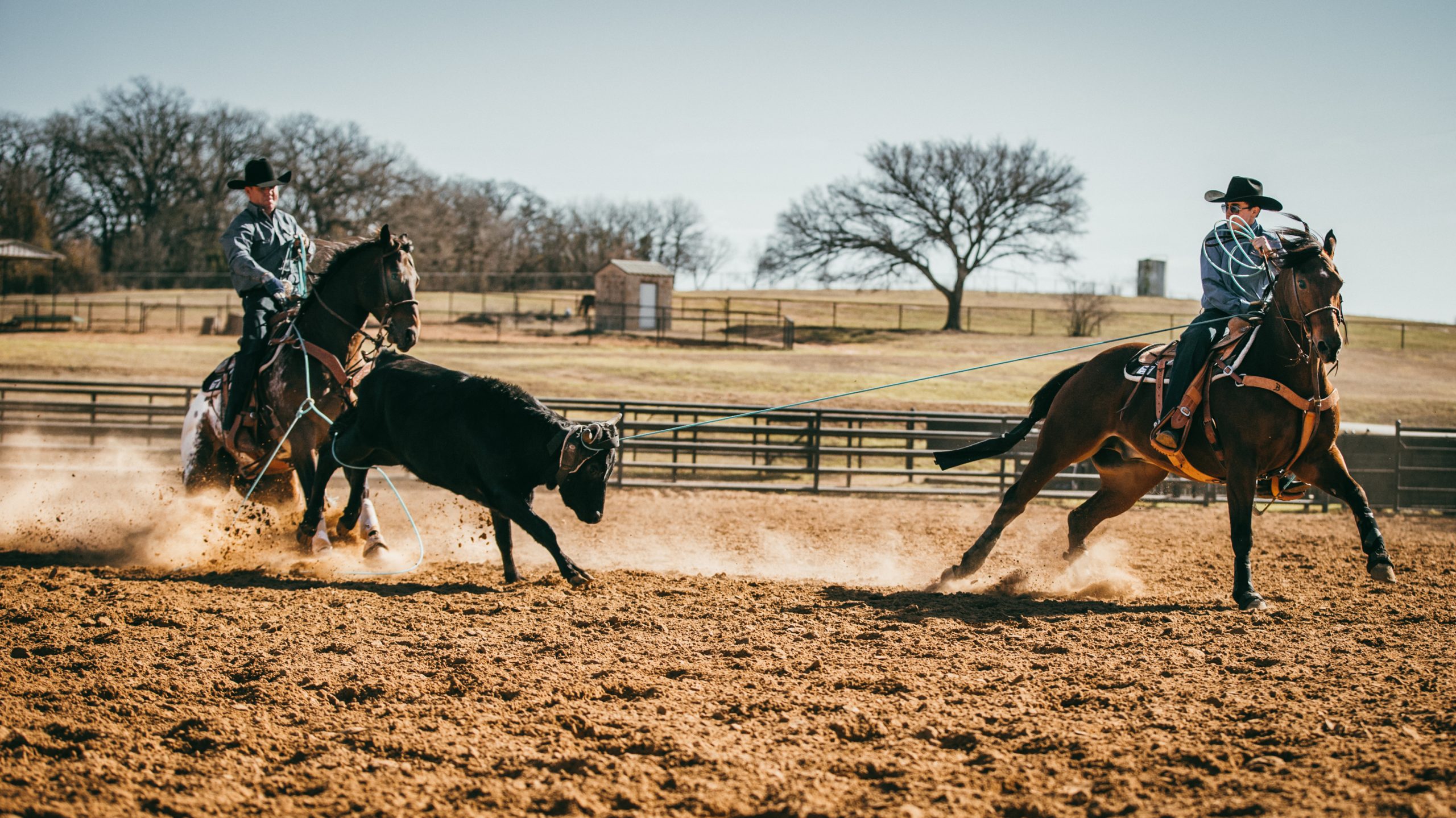 Treston Brazile heading for his dad
Treston Brazile heading for his dad
Texas legend credits a group of cowboys drinking at Red Newell’s Saloon in the cattle-driving southwest Texas town of Pecos with hosting the first official rodeo in the Lone Star State. They were unwinding after a hard day of work wrangling cattle when their conversation veered toward who was the better steer roper and bronc rider. One early July day, the cowboys proposed holding a rodeo to prove who was the better wrangler. It was an unheard-of proposal since rodeos were usually held in the spring on ranches to brand cattle and claim the calves of the season. American Indian and Mexican vaqueros began wrangling cattle this way in the 1700s, going from ranch to ranch to do so. The rodeos would often last for a week or longer, the Messenger reported on June 29, 1894.
The cowboys’ rodeo took place on July 4. Some ranchers pitched in the $40 prize money for the cowboy who proved his claim. Texans came from miles around to see what may or may not have been the first official rodeo, depending on which Old Western town you ask. According to the Texas Escapes website, several places claim to have held the first official rodeo, including Canadian, Texas; Payton and Prescott, Arizona; and Deer Trail, Colorado.
No matter where the first official rodeo occurred, it began to catch on, and rodeos began appearing in communities around Texas and as far away as New York and eventually Europe. Wise County cowboys such as steer roper Gus Pickett, the son of a Texas state representative and Confederate hero, from Decatur and Boyd native “Cowboy” Alvin Baker, a world champion bronc rider, were making headlines for their rodeo skill and drawing thousands of fans to arenas.
In 1899, a year after Cowboy Baker’s birth, the St. Louis Fair Association held a world championship rodeo. Pickett won the world title and, nearly 20 years later, according to the Wise County Historical Society, organized the first official rodeo in Wise County at the Old Settlers Reunion, an annual event honoring old settlers and Confederate veterans like Pickett’s father on the outskirts of Decatur.
Pickett garnered the title of “top cowboy in a colorful era” from the Messenger shortly after he won the world championship in the late 1800s for steer roping. He’d been competing in rodeos all around the country against rodeo cowboys such as Will Rogers, the legendary cowboy movie star, and building friendships with showmen Buffalo Bill and Wild Bill Cody. Like Brazile a century later, steer roping was a skill Pickett had been perfecting since he was a child on his father’s ranch near Decatur. He spent most of his life there, cowboying for his family before he moved on to the Dan Waggoner ranch, where, according to the Messenger, he would become one of the last of the original cowboys to work the ranch.
His father, George Bibb Pickett, became a Texas legend shortly after he returned home from the Civil War. A native of Kentucky, he moved to Wise County in 1854 and built his ranch near Decatur. He was an aggressive negotiator with the American Indians and would later take that skill into the political arena, where he’d win the offices of mayor, county judge, and representative in the Texas legislature. In 1876, he sponsored a bill to create the Texas Rangers “to assist in subduing the Indians in the county,” the Texas Historical Association reported in The Handbook of Texas Online.
In Decatur, the elder Pickett focused on raising cattle on his ranch and rangeland in Jack and Young counties. The area was a gold mine for ranchers like the elder Pickett with the nearby Chisholm Trail and the Fort Worth Stockyards a train stop away. His sons helped him on the ranch. Only Gus would take up the cowboy mantle. His brother, Tom, became a cattle rustler and rode with outlaws Dave Rudabaugh and Billy the Kid before hanging up his guns to become a bartender, then a prospector, a cowhand, and later a deputy U.S. Marshal.
Gus Pickett entered civil service like his father and eventually became the manager of the Wise County Fair and an organizer of the annual Old Settlers Reunion. In early October 1920, he organized a rodeo that would become an annual tradition for Wise County. More than 2,000 people descended on the rodeo arena on the outskirts of Decatur to watch the cowboys ride dusty wild rodeo broncs and bulldog Mexican steers, the Messenger wrote in an October 8, 1920, report. Local favorite “Little Guinn” Williams, Jr., the son of a Decatur and Mineral Wells banker, dazzled the crowd with his rodeo skills.
Like Texas’ first rodeo, whether Pickett’s rodeo was the first in Wise County is also up for debate. The History of Wise County: A Link With The Past, Vol. 1 credits Dan Buck, a horseman from Wise County, with staging the first rodeo in a tent-covered arena for an admission fee. But it was mostly a bronc-riding competition. “Horses were his specialty,” the author writes. “He never used cattle at first.”
When Pickett died at the age of 82, the Messenger called him “one of the last of the surviving cowboys” in his October 18, 1951, obituary.
But he wasn’t.
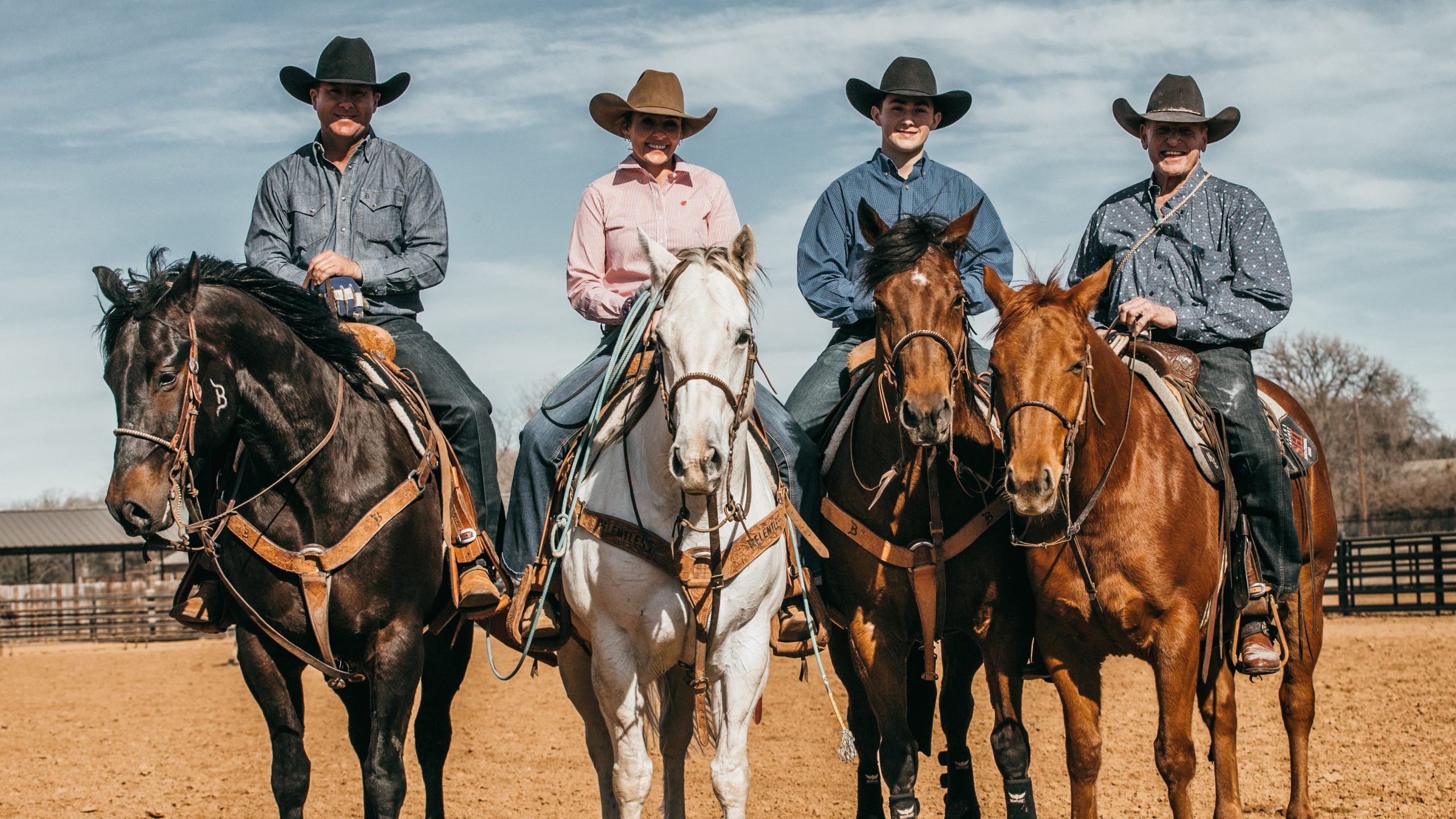 (Left to Right) Trevor Brazile, Shada Brazile (wife), Treston Brazile (son), Roy Cooper (Shada's Stepfather)
(Left to Right) Trevor Brazile, Shada Brazile (wife), Treston Brazile (son), Roy Cooper (Shada's Stepfather)
It’s a lifestyle that’s alive and thriving in Wise County, especially as more rodeo professionals move into the area to raise their children in a place that, Clark says, values the small-town rural way of life. Not to mention that makes sense logistically for rodeo professionals, according to Clark, with major highways 380 and 114 nearby and the “proximity to [DFW] airport without being in the city.”
“We have a very strong rodeo tradition,” says Clark. “It’s a tradition here, a culture here, a respect for the old ways. People support it and value it.”
On the outskirts of Decatur, NRS Ranch showcases this strong rodeo tradition and why people value and support it.
Just off U.S. Route 287 South, the 90,000-square-foot, 400-acre NRS world headquarters appears on an open prairie similar to where Pickett, Baker, Dunn, and Brazile perfected their rodeo skills. It’s the Super Target of the Western lifestyle with aisles upon aisles—30,000 square feet—of ranch gear and Western wear retail. The campus also includes a functioning round pen for equine demonstration, a full-service feed store, a 5,000-square-foot hay barn, and a 7,000-square-foot patio with a fire pit, fountain, and windmill. The new facility was completed in 2015, but tourists from all around the country have been visiting the store since it opened in 1989, buying memorabilia and marveling at the accomplishments of two local rodeo cowboys honored in displays at the entrance to the gargantuan retail outlet.
Brazile’s display alone contains 26 world championship belt buckles in glass cases. His championship saddles—engraved with Team Roper Champion, Steer Roper Champion, All-Around Cowboy Champion—appear throughout the display, stacked from floor to ceiling, filling the area with a new-leather smell. Framed magazine articles on the wall and his championship rides on a mounted large screen TV between his saddles proclaim his status as a multimillion-dollar winner and a rodeo legend like Pickett, Baker, and Webb before him.
Brazile was planning to build a trophy room but figured if he built one of them, only his family and friends would be able to see his buckles and saddles. Displaying them at the NRS, he says, has been a great thing because more people can see his accomplishments and “learn a little more about pro rodeo through that.”
“I was just blessed not to have enough room for all of them,” Brazile adds.
Since retiring from full-time rodeo in 2018, Brazile has been continuing Wise County rodeo’s tradition by inspiring young and old alike with his annual roping clinics at the NRS roping arena. Photographs of Brazile with his students also appear on the mounted TV, reaffirming why he’s known as rodeo’s Superman.
Cooper’s more-modest display across the aisle includes his gold buckles, championship saddles, and lifetime of rodeo achievements; the elder Cooper’s rodeo lineage appears on the wall in a sportscaster’s diagram. His father, Dale “Tuffy” Cooper, an RCA cowboy and 1998 National Rodeo Hall of Fame inductee, appears atop the family tree. Eight-time world champion Roy “Super Looper” Cooper appears next, along with his accolades: 1983 prestigious Triple Crown champion, ProRodeo Hall of Fame, National Rodeo Hall of Fame, and Texas Rodeo Cowboy Hall of Fame. Cooper’s sons appear under his name. Clint and Clif have qualified several times for the Wrangler National Finals Rodeo. Their brother Tuf, who mentored under Brazile, has also qualified and won a world championship title four times.
It’s this family rodeo tradition that thrives in Wise County. And Brazile’s family keeps that tradition alive by training young horses.
Horses will always be a part of the Braziles’ lives.
“I enjoy that part,” Brazile says. “I get to stay connected to the process of making good horses.”
To find out more about Trevor Brazile’s horses, horsemanship, roping tips, and more, check out Relentless Remuda and Relentless Nation on Facebook and Instagram.
Photography by Chris Douglas



